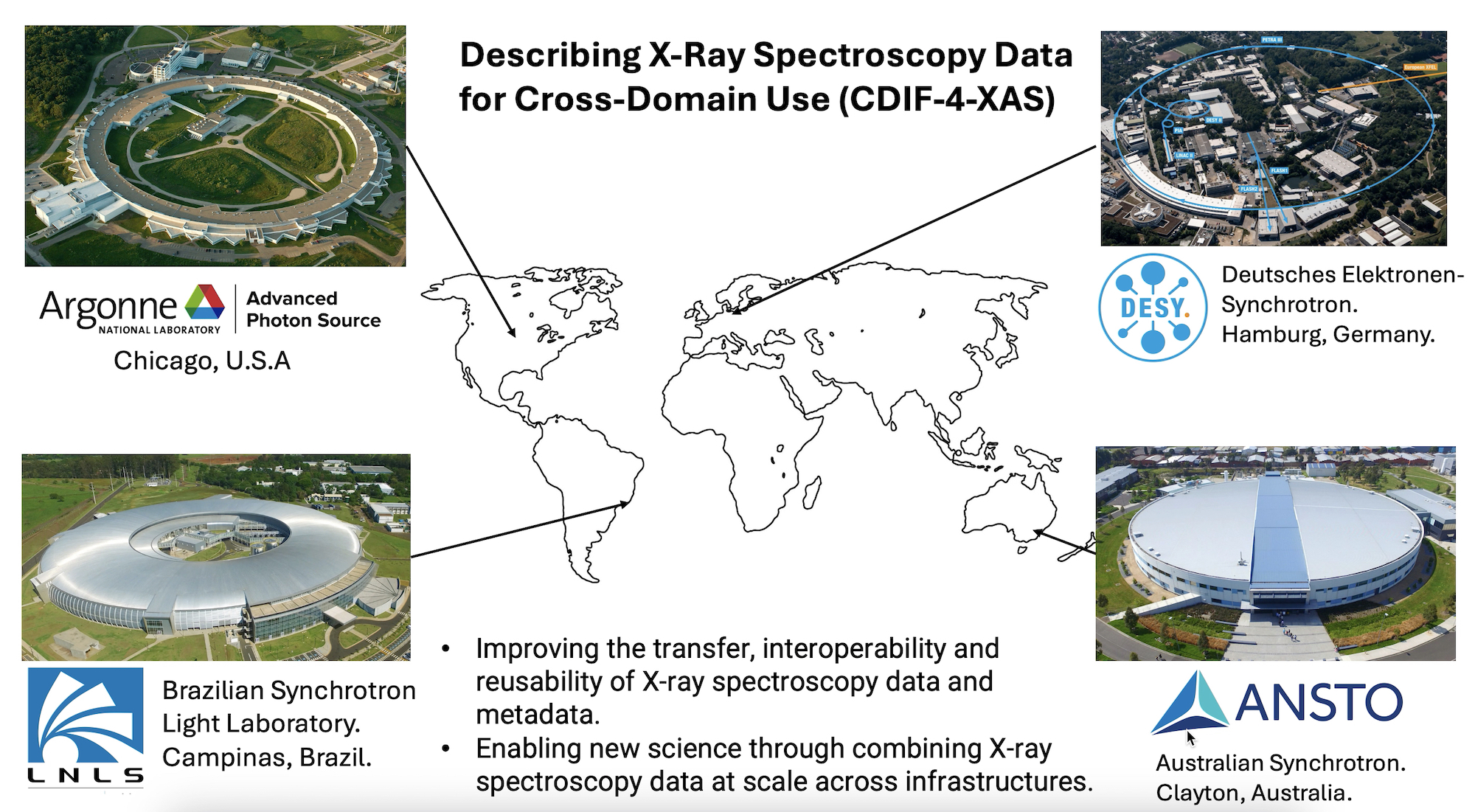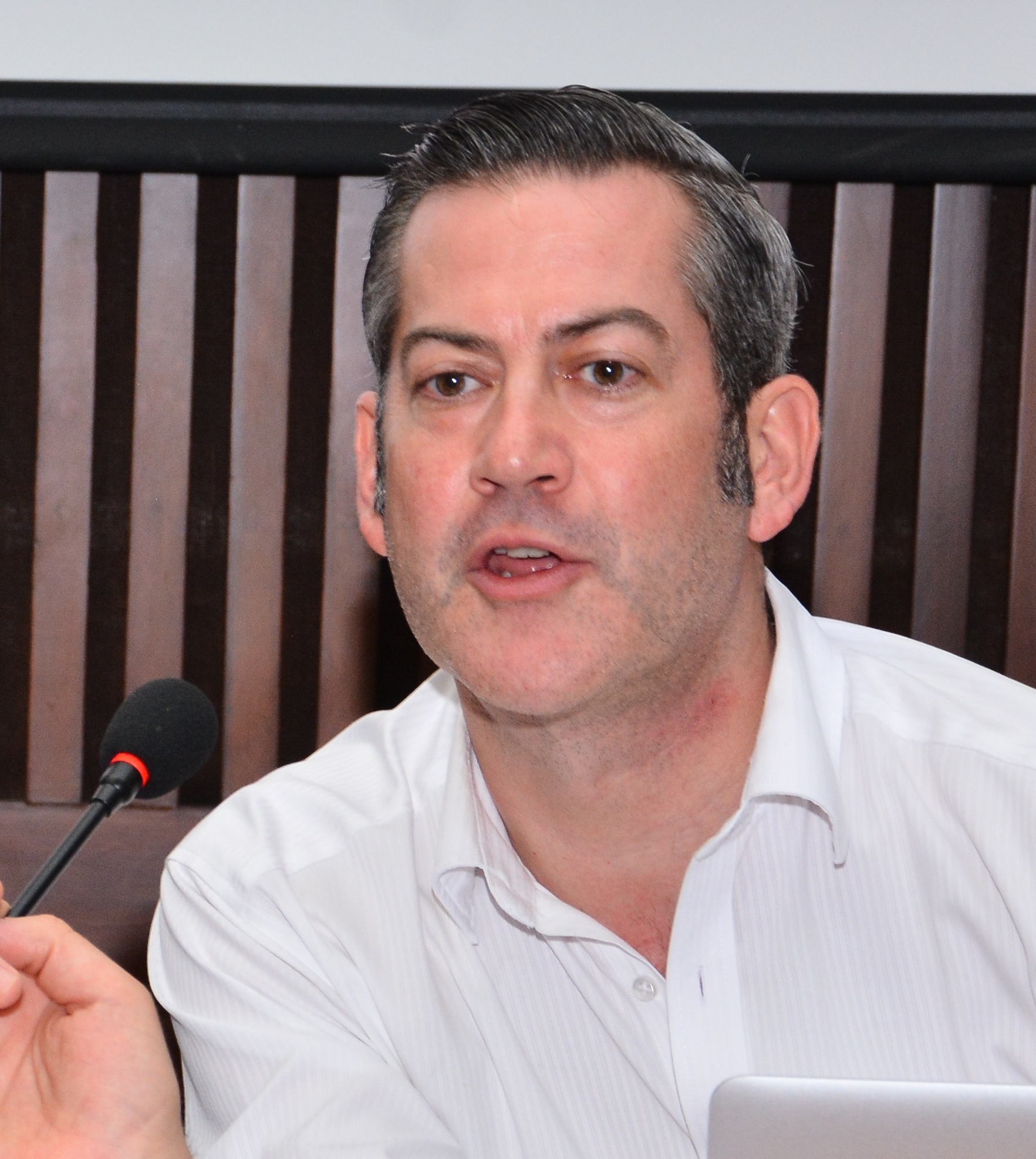Science cluster

Summary
The CDIF-4-XAS project - Describing X-Ray Spectroscopy Data for Cross-Domain Use, will enable new science by making it easier to access, combine and reuse XAS data across research infrastructures (RIs) and disciplines.
CDIF-4-XAS will enhance the interoperability and reusability of XAS data by applying the Cross-Domain Interoperability Framework (CDIF), a set of guidelines and practices for using domain-agnostic standards to support the interoperability and reusability of FAIR data, especially across domain and institutional boundaries. By embracing FAIR principles, the project aims to streamline the sharing of XAS data, thus enabling more efficient data integration across RIs and scientific domains, including life sciences, chemistry, and environmental sciences.

Rutherford Appleton Laboratory, STFC, UKRI, UK.
School of Computer Science and Informatics, Cardiff University, Wales, UK.
Helmholtz-Zentrum Berlin für Materialien und Energie GmbH, HZB, Germany (unfunded partner).
Helmholtz Metadata Collaboration (HMC) Hub Matter, Germany (unfunded partner).
Leandro Liborio, Patrick Austin (RAL, STFC)
Abraham Nieva De La Hidalga (Cardiff)
Heike Görzig, Rolf Krahl (HZB)
Markus Kubin (HMC)
Challenge
Open Science project, Open Science Service, Main RI concerned, Cross-domain/Cross-RI
X-ray Absorption Spectroscopy (XAS) data is vital for many fields, but its specialised formats and metadata conventions hinder cross-domain use. Data sharing between applications, databases, and facilities is inefficient, leading to the loss of essential experimental information. With increasing data volumes and interdisciplinary collaborations, the need for a more interoperable solution becomes urgent.
Solution
The Cross-Domain Interoperability Framework (CDIF) addresses these challenges by establishing domain-agnostic standards to support data sharing across institutional and disciplinary boundaries. Through CDIF-4-XAS, metadata and provenance for XAS data are standardised, enhancing the integration of XAS datasets into EOSC infrastructures. This promotes data reuse across different research domains, making XAS data more accessible and valuable.
The main outputs of the project will be:
- An overview of standards, vocabularies (and ontologies), data formats and practices within the XAS area;
- Semantic descriptions of at least two of these community standards using a CDIF profile (XASCDIF);
- Prototype implementations in relation to i) metadata registries and catalogues; ii) input and outputs for XAS tools; and iii) analysis frameworks for the widely-used Galaxy platform within EOSC, with documentation and short summary reports;
- Recommendations and guidelines for the use of CDIF for XAS data (XAS-CDIF) and in other domains;
- At least two scientific articles submitted to i) a journal for the data stewardship and metadata community, and ii) a journal dealing with data issues in chemistry.
Scientific Impact
Coordinated by CODATA, and involving a number of PaNOSC partners and key infrastructures, CDIF-4-XAS will unlock new possibilities for research by enabling seamless data combination and analysis across RIs. Researchers in energy, chemistry, and environmental sciences, among others, will benefit from easier access to XAS data. By implementing CDIF for XAS data (XAS-CDIF), the project tackles the interoperability and reusability challenges described above, and can better integrate the XAS data into the emerging EOSC infrastructures for cataloguing, integration and analysis. The benefits will be considerable: existing resources will become more available, and it will become easier and more efficient to use data across RIs and in other domains. Finally, XAS data is a key research product in the domain of energy research, thereby representing key strategic developments towards a sustainable future for the global society. XAS is an important characterization method for materials used in these fields and essential for developing new materials.
Results
- D1 ‘Overview of X-Ray Absorption Spectroscopy standards, vocabularies (and ontologies), data formats and practices’ | DOI: This document provides a landscape analysis of current practices, standards, vocabularies, ontologies, schemas, and data formats used in the generation, curation, and publishing of X-Ray Absorption Spectroscopy (XAS) data, with a particular focus on efforts to create community standards that facilitate interoperability. See: https://codata.org/initiatives/making-data-work/worldfair-2/cdif-4-xas/d1-overview-of-x-ray-absorption-spectroscopy-standards/
- D2 ‘CDIF-4-XAS: Mappings from Community Standards to CDIF’ | DOI: This package contains several files, each contributing different information regarding a mapping from common X-Ray Absorption Spectroscopy (XAS) data formats to the Cross Domain Interoperability Framework (CDIF) recommended standards. The "CDIF-4-XAS: Mappings from Community Standards to CDIF" document and the associated spreadsheet and other materials present an initial attempt to take the major community standards used for X-Ray Absorption Spectroscopy (XAS) and map them to the standards recommended for cross-domain FAIR sharing of data by the Cross Domain Interoperability Framework (CDIF) guidelines. See: https://codata.org/initiatives/making-data-work/worldfair-2/cdif-4-xas/d2-mappings-from-community-standards-to-cdif/
Events
- 24-26 March 2025 | Berlin, Germany - Poster presentation at the DAPHNE4NFDI Annual Meeting 2025
- 17-21 November 2025 | Schloss Dagstuhl, Wadern, Germany - Dagstuhl Workshop, ‘The Provenance Chain: Connecting and Reusing Data, Models, and Experiments’
Principal investigator

Simon Hodson is Executive Director of CODATA, and an expert on data policy issues and research data stewardship. He was chair of the EC report Turning FAIR into Reality, and vice-chair for the UNESCO Recommendation on Open Science. He was the coordinator of the EC-funded WorldFAIR Project.

